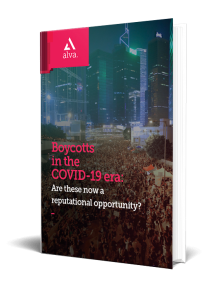Boycotts in the COVID-19 era: Are these now a reputational opportunity?
Since the outbreak of Covid-19 in late February, there have been countless studies seeking to understand its effects on human behaviour.
These have ranged from research suggesting that the early stages were characterised by greater altruism and a spirit of solidarity, to more recent reports over growing frustrations, and anger at restrictions on movement, spilling over into public protests and demonstrations.
In the corporate world, these shifting dynamics have often borrowed the language of stakeholder capitalism, with a focus on the social contract and praise for the multitudinous ways in which firms have been perceived to embrace their role in society through the provision of support to the most vulnerable.
But while companies may have enjoyed an initial honeymoon period of appreciation for their altruism in the early phase of the pandemic, there is mounting evidence to suggest that they are no longer able to pursue their coronavirus agenda entirely on their own terms. Increasingly over the past eight to 12 weeks, we at alva have observed a growing tendency towards the naming and shaming of firms which are seen to be breaking the social contract.
The clearest manifestation of this is in calls for companies to be boycotted.
In this case study, we look at the history of the corporate boycott over the past two years, in order to understand:
- How has boycott intensity increased over the last two years?
- How has Covid-19 shifted consumers’ approach to boycotting?
- What can and should companies do in the face of this phenomenon?





